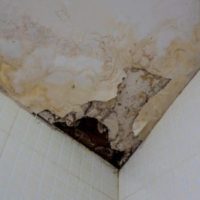Mold Remediation – What You Need to Know

Mold is everywhere. You’re breathing some right now. Don’t panic; it’s okay. What’s not okay is finding a visible mold infestation in your home, or smelling that musty odor. A high concentration of mold can be dangerous to your health, especially if you have allergies, sensitivities or a weakened immune system, and some types of mold can be highly toxic to anyone. Mold can also damage your home, inviting costly repairs or causing your home value to take a hit just when you were planning to sell. Here’s how to know the good from the bad, and what to do about it.
Know Your Mold
Those little black dots on your shower curtain, shower wall, the floor outside your tub.. you get the idea. That’s mildew, and it’s actually a type of mold, although it usually sounds like mold’s trusty sidekick (or partner in crime) in bathroom cleaner commercials. Mold and mildew are actually both similar types of fungus with names like Aspergillus, Blastomyces, C. neoformans, Histoplasma and others. Exposure to these molds may or may not make you sick, depending on personal biological and environmental factors. One type of mold known scientifically as Stachybotrys chartarum or Stachybotrys atra and commonly referred to as “black mold,” is considered by many to be especially dangerous. To protect your health and keep your home from damage, any visible mold growth should be remediated. Information about mold and health issues can be found at the Mold web site of the CDC (U.S. Centers for Disease Control and Prevention).
Mildew stays on the surface, while mold burrows down deep. Mildew on your bathroom surfaces likely won’t damage your home or harm your health, and it can typically be killed and cleaned away with a diluted bleach solution or household cleaners that advertise specifically to kill mildew (such as Tilex Mildew Root Penetrator). Be careful when using strong cleaners such as ammonia or bleach, and be sure to keep the room well-ventilated while you work. Also, never mix ammonia and bleach together. The combination can be volatile and release toxic fumes that can damage your eyes and lungs.
If you find mold growing on your carpet or wood floors, or on your walls or window sills, it may be harder to treat, and you may have some serious repair work to do if rot has set in. In addition to identifying the mold visibly, you may also identify it by its musty smell. If you smell the must but don’t see the mold, it may be in your walls, ventilation ducts, crawl spaces, attic or basement. It may be time to call in professional help in those situations.
Protect Yourself. Contain the Contamination.
If remediating mold yourself, be sure to wear gloves and eye protection, as well as NIOSH-approved airway protection, such as an N-95 respirator. (Don’t let the official-sounding name scare you; these simple masks can be found at any home improvement store for under $20.) Also consider wearing your oldest clothes that you don’t mind throwing away after you are finished. This will keep mold from spreading to your other laundry or establishing itself in your washing machine.
Containment is key when treating mold infestations. Mold reproduces by releasing spores by the millions, which can travel through the air and settle in other parts of your home once you start disturbing it. To help keep the mold contained to the room where you found it, seal off doorways with plastic sheeting before you start, and put an old or cheap box fan (you’ll throw it out when you are done) in the window facing out, so it can help draw air (and mold) out of the room. Seal the area around the fan with plastic sheeting or 2x4s. You’ll want to turn off your heating or A/C before you start as well, to keep mold out of your ventilation system.
If the mold has gotten into the carpet, walls or floors, simply treating the surface will probably not extinguish the problem. More likely, you will need to cut away the contaminated surface and replace it, with new carpet, wood, drywall, etc. If a normally hard surface feels soft or mushy, that’s a sign that the affected area needs to be replaced.
When Should You Call in the Pros?
A lot can be done by yourself if you have the time, inclination, and enjoy watching YouTube how-to videos posted by other handy homeowners. If you are not very handy, if the problem is very large, or if there is significant damage, it may be easier, safer and even cheaper in the long run to call in professional help. Professional mold remediation experts may seem pricey, and you may prefer to save money and just hire a local handyman. But the handyman may not take the sorts of precautions you would like and could end up spreading the problem to other areas of the house, or sickening himself or you, your family and pets.
Not all pros are created equal. Mold inspection companies particularly have come under scrutiny for making unproven claims about the presence of mold in your home and the need for costly remediation. If you see or smell the mold yourself, then any contractor with experience in mold remediation will likely know the proper steps to take, and you can shop around to find one who will do a good job and give you a reasonable price. Check out a company with your local Better Business Bureau for complaints, or use online review sites to see what others are saying about a professional’s quality of work, business dealings, etc.
If you live in an apartment building or rent a house, you may be able to get the remediation paid for by the owner. Consult a local attorney to find out about the laws in your city or state which may hold the owner liable to pay for the cleanup. Most consumer law or personal injury attorneys will give you a free consultation and can help you file a claim against the property owner for no up-front cost. If you own a home and the problem preexisted your purchase, or if the mold growth is the result of water damage such as from a leaking roof or plumbing leak inside the walls, you may have a claim to file with your homeowner’s insurance, title insurance or previous owner. Here again you may need to have a lawyer help you get your claim paid, and most civil trial lawyers will not charge a fee unless they obtain a recovery for you.



